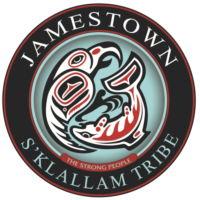The Jamestown S’Klallam Tribe is one of 566 American Indian and Alaska Native Tribes in the United States of America. The Tribe shares a common history, territory and political rights with its sister Tribes the Lower Elwha Klallam and Port Gamble S’Klallam Tribes. The S’Klallam people have lived on the north shores of the Olympic Peninsula since time immemorial. In 1855, the S’Klallam people signed the Treaty of Point No Point, ceding their lands (which spanned from the Makah territory to the west to the Skokomish territory to the south to the Suquamish territory to the east) in exchange for services from the United States government, and a promise of continued access to their “usual and accustomed areas” for hunting, fishing and gathering. As settlers encroached on their lands, the Jamestown band (those living in east Clallam and Jefferson Counties) pooled their money and purchased 200 acres in Sequim in 1874 – the area now known as Jamestown – so that each family would have access to the sea and its richness of resources. They lived dual lives – working with the European settlers in the forest and on the sea, opening businesses, farming and participating in community, while trying to hold onto their cultural traditions. The United States government acted ambivalently towards treaty Tribes for the next 100 years, at times providing services (including a water system and school at Jamestown) to the Jamestown people, and at times denying that they had any obligation towards Tribes. In the 1970s, President Nixon’s administration approved a process through which Tribes could prove their validity as sovereign nations with whom the U.S. government had signed treaties. The Jamestown S’Klallam Tribe successfully navigated this arduous process, and on February 10, 1981, received official “federal recognition.” This process enabled the Jamestown Tribe to access the programs and services that had been promised in the 1855 Treaty. For the past 30+ years, the Jamestown S’Klallam Tribe has utilized its status as a federally acknowledged sovereign Nation to continue its work as a progressive, forward-thinking people, intent on pursuing its self-sufficiency goal through diversified economic development and education.

